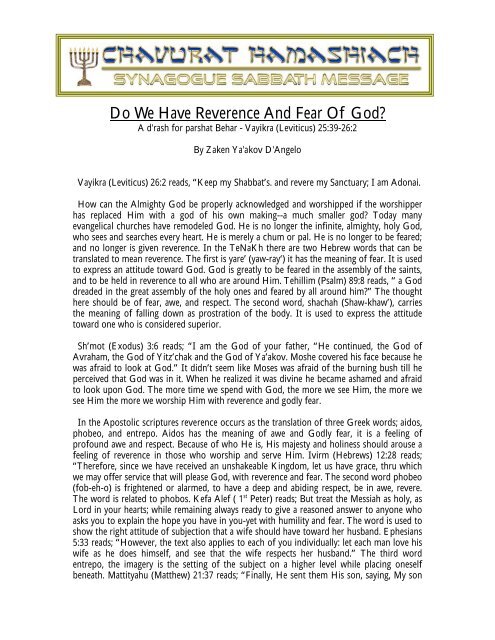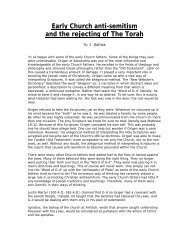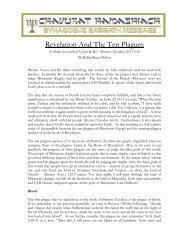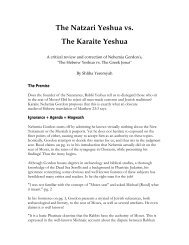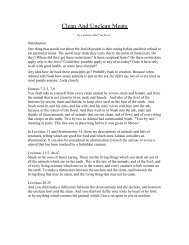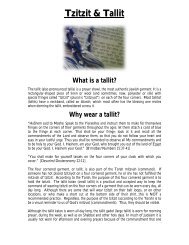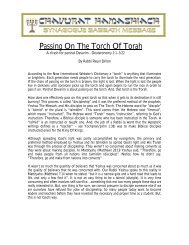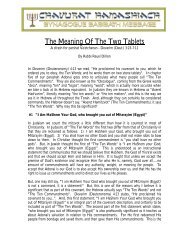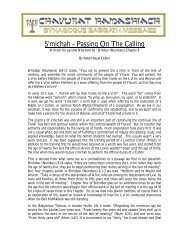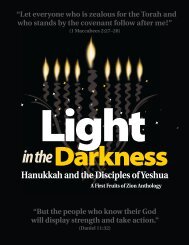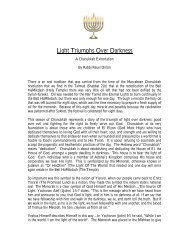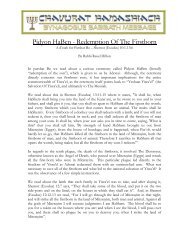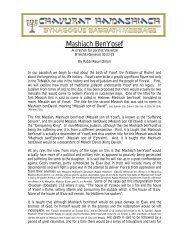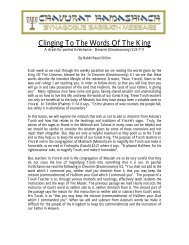Do We Have A Reverence And Fear Of God?
Do We Have A Reverence And Fear Of God?
Do We Have A Reverence And Fear Of God?
You also want an ePaper? Increase the reach of your titles
YUMPU automatically turns print PDFs into web optimized ePapers that Google loves.
<strong>Do</strong> <strong>We</strong> <strong>Have</strong> <strong>Reverence</strong> <strong>And</strong> <strong>Fear</strong> <strong>Of</strong> <strong>God</strong>?A d'rash for parshat Behar - Vayikra (Leviticus) 25:39-26:2By Zaken Ya'akov D'AngeloVayikra (Leviticus) 26:2 reads, “Keep my Shabbat’s. and revere my Sanctuary; I am Adonai.How can the Almighty <strong>God</strong> be properly acknowledged and worshipped if the worshipperhas replaced Him with a god of his own making--a much smaller god? Today manyevangelical churches have remodeled <strong>God</strong>. He is no longer the infinite, almighty, holy <strong>God</strong>,who sees and searches every heart. He is merely a chum or pal. He is no longer to be feared;and no longer is given reverence. In the TeNaKh there are two Hebrew words that can betranslated to mean reverence. The first is yare’ (yaw-ray‘) it has the meaning of fear. It is usedto express an attitude toward <strong>God</strong>. <strong>God</strong> is greatly to be feared in the assembly of the saints,and to be held in reverence to all who are around Him. Tehillim (Psalm) 89:8 reads, “ a <strong>God</strong>dreaded in the great assembly of the holy ones and feared by all around him?” The thoughthere should be of fear, awe, and respect. The second word, shachah (Shaw-khaw’), carriesthe meaning of falling down as prostration of the body. It is used to express the attitudetoward one who is considered superior.Sh’mot (Exodus) 3:6 reads; “I am the <strong>God</strong> of your father, “He continued, the <strong>God</strong> ofAvraham, the <strong>God</strong> of Yitz’chak and the <strong>God</strong> of Ya’akov. Moshe covered his face because hewas afraid to look at <strong>God</strong>.” It didn’t seem like Moses was afraid of the burning bush till heperceived that <strong>God</strong> was in it. When he realized it was divine he became ashamed and afraidto look upon <strong>God</strong>. The more time we spend with <strong>God</strong>, the more we see Him, the more wesee Him the more we worship Him with reverence and godly fear.In the Apostolic scriptures reverence occurs as the translation of three Greek words; aidos,phobeo, and entrepo. Aidos has the meaning of awe and <strong>God</strong>ly fear, it is a feeling ofprofound awe and respect. Because of who He is, His majesty and holiness should arouse afeeling of reverence in those who worship and serve Him. Ivirm (Hebrews) 12:28 reads;“Therefore, since we have received an unshakeable Kingdom, let us have grace, thru whichwe may offer service that will please <strong>God</strong>, with reverence and fear. The second word phobeo(fob-eh-o) is frightened or alarmed, to have a deep and abiding respect, be in awe, revere.The word is related to phobos. Kefa Alef ( 1 st Peter) reads; But treat the Messiah as holy, asLord in your hearts; while remaining always ready to give a reasoned answer to anyone whoasks you to explain the hope you have in you-yet with humility and fear. The word is used toshow the right attitude of subjection that a wife should have toward her husband. Ephesians5:33 reads; “However, the text also applies to each of you individually: let each man love hiswife as he does himself, and see that the wife respects her husband.” The third wordentrepo, the imagery is the setting of the subject on a higher level while placing oneselfbeneath. Mattityahu (Matthew) 21:37 reads; “Finally, He sent them His son, saying, My son
they will respect.” Ivrim (Hebrews) 12:9 reads; “Furthermore, we had physical fathers whodisciplined us, and we respected them; how much more should we submit to our spiritualFather and live.”<strong>Reverence</strong> is respectful, submissive attitude of mind which results in affection and greatesteem for the person to whom it is directed. Therefore children reverence their parents,wives reverence their husbands, subjects reverence their ruler and all must reverence <strong>God</strong>.<strong>We</strong> reverence the name of <strong>God</strong>; Mattityahu 6:9 reads; “You therefore, pray like this: OurFather in heaven! May your Name be kept holy.”Genuine <strong>Reverence</strong> and self sacrificing love go hand and hand. You cannot have onewithout the other and expect to live a pleasing life before <strong>God</strong>. Someone may boast ofhaving reverence for <strong>God</strong> but unless he manifests it by conduct and obedience he is asJames has told us are dead. Ya’akov (James) 2:26 reads; “Indeed, just as the body without aspirit is dead, so too faith without actions is dead.” <strong>We</strong> must demonstrate our reverence byour actions. Ya’akov 1:22 reads; “<strong>Do</strong>n’t deceive yourselves by only hearing what the Wordsays, but do it.” Irreverence produces disobedience, true reverence will produce andpromote obedience. The fear of <strong>God</strong> is a must toward practical godliness. The Word and<strong>God</strong>’s Ruach are major elements that bring us to the knowledge of His mind and will.Yeshua lived out His life in perfect righteousness and maintained the deepest reverencetoward the Father.Ivrim (Hebrews) 5:7 reads; “During Yeshua’s life on earth, He offered up prayers andpetitions, crying out loud and shedding tears, to the one who had the power to deliver Himfrom death; and He was heard because of His godliness.” I like Young’s literal translation ofthis verse, it reads; “who in the days of His flesh both prayers and supplications unto Himwho was able to save Him from death--with strong crying and tears--having offered up, andhaving been heard in respect to that which He feared.” The term fear indicates reverentialfear. It is used of Cornelius of Caesarea who feared <strong>God</strong>. He manifested His reverence for<strong>God</strong>. Paul used the same word at Antioch in Pisidia, he appealed to those that feared <strong>God</strong>.Kefa Alef (1 st Peter) 2:17 reads; “Be respectful to all--keep loving the brotherhood, fearing<strong>God</strong> and honoring the emperor.”In the parable of the wicked husbandmen in Mattityahu chapter 23 beginning in verse 33-38 it reads; Now listen to another parable. There was a farmer who planted a vineyard. Heput a wall around it dug a pit for the winepress and built a tower, then he rented it to tenantsand left. When the harvest time came he sent his servants to the tenants to collect his shareof the crop. But the tenants seized his servants, this one they beat up, that one they killed,another they stoned. So he sent some other servants, more than the first group and they didthe same to them. Finally he sent his son, saying my son they will respect. But when thetenants saw the son, they said to each other, this is the heir. Come lets kill him and take hisinheritance. <strong>Reverence</strong>, respect, and submission is what is due the eternal Son of <strong>God</strong>, theLord of Glory, Yeshua. Its expression is what should be seen first and foremost in worship,if it is not seen there it will not be seen in other areas of life. A reverent deficient worshipwill lead to those who are shallow in commitment, in seriousness, and in holiness.1 st Timothy 4:7-9 reads; “But refuse <strong>God</strong>less bubbie-meises (old wives tales), and exerciseyourself in godliness. For although physical exercise does have some value, godliness isvaluable for everything, since it holds promise both for the present life and for the life tocome. Here is a statement you can trust, one that fully deserves to be accepted”. Shaul shows
the importance of this passage saying that it fully deserves to be accepted, Shaul is talkingabout the necessity of reverence toward <strong>God</strong>. <strong>God</strong>liness here is the Greek word sebeia,meaning well devout, <strong>God</strong>ly and pious. It is referring to our total attitude toward <strong>God</strong>.<strong>God</strong>liness is important as it sits among other virtues. 1 st Timothy 6:11 reads; “ But you, asa man of <strong>God</strong>, flee from these things; and pursue righteousness, godliness, faithfulness, love,steadfastness, gentleness.” Kefa Bet (2 nd Peter) 1:5-7 reads; “for this very reason, try yourhardest to furnish your faith with goodness, goodness with knowledge, knowledge with selfcontrol,self-control with perseverance, perseverance with godliness, godliness with brotherlyaffection and brotherly affection with love.” The word godliness in the epistles seems tomean a right attitude toward <strong>God</strong>, that is reverence and respect. It is all about the fear of<strong>God</strong>, humility before <strong>God</strong> and submission before <strong>God</strong>. In His Kehillah, is there a collapseof such reverence and respect? Many want a thrilling sense of <strong>God</strong> and glory, anoverflowing of His joy and Ruach, but this can only come with reverence. Our <strong>God</strong> mustalways be the only <strong>God</strong> we come to with reverence and submission. If we dislike reverence,we will only achieve a sham, a false counterfeit, a shallow emotional substitute. <strong>We</strong> do notneed to have sensationalism we need reverence, fear and awe of the one and only true <strong>God</strong>.The 5 th commandment in Shemot (Exodus) 20:12 reads; “Honor your father and mother,so that you may live long in the land which Adonai your <strong>God</strong> is giving you.” The Hebrewword for honor is Kabad, it suggest heaviness, weightiness, glorify. It implies long lasting, ora continuing sense and significant lifelong responsibility. In English, honor means to givehigh regard, respect, and esteem; to give special recognition to; to give respect, an outwardtoken, sign or act that manifests high regard for. Though this commandment is primarilyaimed at the function of parenting, but it is not limited to it. Why does <strong>God</strong> want us tohonor our parents? First the family is the basic building block of society, the stability of thefamily is essential to the building stability in the community. The more respectful we are ofour parents, the greater degree of respect will be carried beyond the immediate family andinto strengthening the community. The family is also the main building block ofgovernment. The lessons and principles learned from honoring, respecting and submitting to<strong>God</strong> results in a society stable enough to promote the development of the whole person.Parents are <strong>God</strong>’s representatives, His agents, to begin preparations for <strong>God</strong>’s Kingdom.<strong>God</strong> is honored and revered in the parents when children obey them. When we keep thefifth commandment properly, it leads us to revere and obey <strong>God</strong>. Yeshua says worshippersworship Him in vain when their hearts are far from Him. Mattityahu 15:8-9 reads; “Thesepeople honor me with their lips, but their hearts are far away from me. Their worship of meis useless.” It seems like we can say worship means having a bowed-down head and heart aswe revere our Maker. It is having an attitude of total and unconditional surrendering to theone we call Master, our Lord, our <strong>God</strong>, our Savior. Worshipping thus becomes a relationshipwith a holy <strong>God</strong> characterized by a bowed down heart in total surrender. It reflects one whois poor in Spirit, and one who mourns as he recognizes his spiritual bankruptcy. As we bowdown our hearts and heads to <strong>God</strong> in worship, crying out for mercy and to be filled with<strong>God</strong>’s attitudes, we are comforted and filled. Tehillim (Psalm) 95:6 reads; “Come, lets bowdown and worship; let’s kneel before Adonai who made us.” when Iyov heard the horrificnews of the total loss of everything he once had; including his children, he did what manywould consider unusual. Job 1:20 reads; “Iyov got up, tore his coat, shaved his head, felldown on the ground and worshipped.” Here is a great reference to reverence and worship.<strong>Do</strong> some of the churches of today teach the fear of <strong>God</strong>, or has their teaching truned Him
into a divine, little snuggly teddy bear, a doddering grandfather, or maybe an absenteelandlord busy doing other things? Mishlei (Proverbs) 9:10 reads; “The fear of Adonai is thebeginning of wisdom and knowledge of holy ones is understanding.” The fear of <strong>God</strong> isimportant, yet there are many churches and ministries that try to soften the word fear.Nevertheless, the word fear in Hebrew (yare) means afraid, fear, cause to frighten, to revere,make afraid, dread. <strong>God</strong> wants more from us, He wants us to have a deep, abiding, andreverential awe for Him. He is all powerful, holy, just, good, kind, careful, encouraging,inspiring, merciful, patient, loving, forgiving, and wise. He is far more than one we shouldjust respect. Reverential awe is wisdom’s foundation, as it moves us to obedience. <strong>We</strong> needthis quality, for our eternal lives are on the line. It used to be that someone known to believein <strong>God</strong> was referred to as a <strong>God</strong> fearer. It marks our relationship with <strong>God</strong> and sets us apartfrom others.Revelation 4:8-11 reads; “Each of the four living beings had six wings and was coveredwith eyes inside and out and day and night they never stop saying, Holy, Holy, Holy isAdonai, <strong>God</strong> of heaven’s armies the one who was, who is, and who is coming. <strong>And</strong>whenever the living beings give glory, honor and thanks to the One sitting on the throne, tothe One who lives forever and ever, the 24 elders fall down before the One sitting on thethrone, who lives forever and ever and worship Him. They throw their crowns in front ofthe throne and say, “You are worthy, Adonai Eloheinu, to have glory, honor and power,because you created all things--yes, because of your will they were created and came intobeing!” Here we see the angels, elders, and four living creatures showing their reverence to<strong>God</strong>. Thankfulness is a duty to which <strong>God</strong>’s elect are bound. Praise and thank <strong>God</strong> for allHis work and for providing brethren by whom we can be encouraged. By developing athankful attitude; we prepare ourselves for the coming Kingdom of <strong>God</strong>. They adore theonly Lord <strong>God</strong> Almighty, the unchangeable and everlasting <strong>God</strong>, the eternal being that sitsupon the Throne. <strong>We</strong> owe all our glory to Him, our glory comes from glorifying Him.He is the creator of all things and none but the creator should be adored. He preserves allthings by His and only His sustaining power. <strong>We</strong> are all dependent upon the will and powerof <strong>God</strong>, we are worshippers not to be worshipped. Colossians 1:16-17 reads; “because inconnection with Him were created all things-in heaven and on earth, visible and invisible,whether thrones, lordships, rulers, or authorities- they have all been created thru Him andfor Him. He existed before all things, and he holds everything together.” Yeshua is theeternal word, and the world was made by <strong>God</strong>’s word. Everything was made for Hispleasure and for His praise, He is the cause of all things. All of creation is kept together bythe power of the Son of <strong>God</strong>, and He preserves it and keeps it from becoming confusion.Revelation 14:7 reads; “In a loud voice He said, “fear <strong>God</strong>, give Him glory, for the hour hascome when He will pass judgment! Worship the One who made heaven and earth, the seaand the springs of water!”. To worship anything besides Him who created the world isidolatry. Mattityahu (Matthew) 10:28 reads; “<strong>Do</strong> not fear those who kill the body but arepowerless to kill the soul. Rather, fear Him who can distroy both soul and body in Gei-Hinnom.The fear of <strong>God</strong> does not necessarily mean reverence, there are verses in <strong>God</strong>’s wordwhere fear means fear, terror. For example in Yirmeyahu (Jeremiah) 5:22 it reads; “<strong>Do</strong>n’tyou fear me? Says Adonai. Wont you tremble at my presence?” The Hebrew is yare. Pachadin Hebrew means be startled, be afraid, be in fear, stand in awe. Tehillim (Psalm) 119:120reads; “My body trembles for fear of you; your rulings make me afraid.”
Our all consuming <strong>God</strong> needs to be feared, maybe this might shake some of us up.Yesha’yahu (Isaiah) 8:12-13 reads; “<strong>Do</strong>n’t regard as alliance what this people calls alliance,and don’t fear what they fear or be awestruck by it, but Adonai-Tzva’ot consecrate Him! LetHim be the object of your fear and awe!” <strong>We</strong> must sanctify our <strong>God</strong>, give Him the glory dueHis name and behave towards Him as those that believe Him to be a holy <strong>God</strong>, we mustmake Him our fear, the object of our fear. <strong>We</strong> must stand in awe of His sovereignty, beafraid of displeasing Him. Nechemyah (Nehemiah) 4:8 reads; “After inspecting them, Istood up and addressed the nobles, leaders and the rest of the people: “<strong>Do</strong>n’t be afraid ofthem! Remember Adonai who is great and fearful; and fight for your brothers, sons,daughters, wives and homes.” Those that are afraid of the reproach of men forget the Lordtheir Maker. Yesha’yahu (Isaiah) 51:12-13 reads; “I, yes I, am the one who comforts you!Why are you afraid of a man who must die; of a human being, who will wither like grass?You have forgotten Adonai, your Maker, who stretched out the heavens and laid thefoundations of the earth, instead your in constant fear all day because of the oppressor’srage, as he prepares to destroy! But where is the oppressor’s rage?Iyov (Job) 23:13-16 reads; “But He has no equal, so who can change Him? What He desiresHe does. He will accomplish what is decreed for me, and He has many plans like this. This iswhy I am terrified of Him; the more I think about it, the more afraid I am--<strong>God</strong> hasundermined my courage; Shaddai frightens me.” Iyov did not fear that <strong>God</strong> would let himdown, or that He is not faithful or just, or forgiving; in fact he has an intense determinationto make us holy (so we can be with Him forever) is cause for the right kind of <strong>God</strong>ly fear:<strong>God</strong> is the above all perfectionist, He will get what He wants, and if that is us, it is fearful torealize just how far He will go. He is the potter and intends vessels of holiness. <strong>We</strong> need notfear that <strong>God</strong> might fail us or give up on us, but rather He is indeed faithful to finish whatHe has started.I pray that this synagogue would become a place where our relationship with Him becomesa burning presence in our lives. I pray that He shatters our pride into little grains of sand,that He burns our sins into ashes and that He reveals to us, stripping us naked, showing uswho we are in Him. <strong>We</strong> need to become a place where nothing but us is safe in Hispresence. Nothing including our plans, our money, our possessions, and our needs. Thisworld is desiring to see people whose <strong>God</strong> is holy, frightening, gentle, tender, and merciful.A <strong>God</strong> who wants to espouse to each and every person, I LOVE YOU!To read more messages like this visit: www.synagoguechm.com


